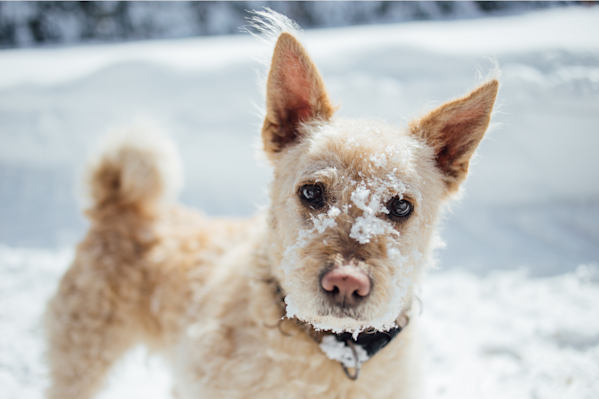Winter is right around the corner, and it’s important to make sure you pet is ready for colder temperatures, and in some areas, an increased likelihood of snow and ice.
Cold weather can cause dangerous situations for your dog or cat if you don’t take precautions to have your pet protected from the elements. Read on for some cold weather safety tips to keep your pup or feline friend safe and warm this upcoming winter.
Cold weather safety tips for pets
Once the temperature starts to drop, you should make sure your pet is properly prepared for when they go outdoors, and also taken care of when they get back inside. Here are some things to keep in mind when braving the cold weather with your dog or cat.
Keep your pet inside as much as you can
Shorter, colder days should also mean shorter walks for your pup—and no cat or dog should be left outside for any period of time if it gets particularly cold.
“As a general rule, I would be careful of leaving cats and dogs out in the cold when it starts to dip below 25 degrees Fahrenheit,” recommends Dr. Yui Shapard. “Some pets are also much more prone to hypothermia than others, such as Chinese Crested dogs, Sphynx cats, Miniature Pinschers, and other breeds with short coats or minimal undercoats to help insulate their bodies.”
Recently ill or injured pets as well as older pets are also more prone to the cold and should be kept inside as much as possible.
Protect their paws
While your pet’s paws are much more durable than our own human feet, cold weather can still get to them. If your dog or cat’s feet are uncomfortably cold, you may see them stop suddenly, whine, or lift their paws repeatedly.
In the winter, people often place products like salt on the ground to prevent ice from forming. Salt and other chemical agents like antifreeze can be harmful to your pets, and in the case of antifreeze, can be fatal if ingested.
The best way to protect your pet’s paws and keep them away from melting agents is to put booties on them. If you don’t have booties or your pet doesn’t tolerate them, you can also put some petroleum jelly or another paw protectant on their feet before taking them outside. You can also limit their exposure to these agents by using pet-friendly ice melting products for your own steps and sidewalks.
Once you come in from a walk, gently rub the bottom of your pet’s paws with a damp towel to completely remove salt and other irritants they may have picked up. Once you clean them, you should also dry them completely with a dry towel.
Don’t leave your pet in a car
Cars in cold weather can keep the freezing air locked in, making it possible for your pet to freeze. Because of this, just like in hot months, leaving your pet in the car in the winter is not recommended.
Keep them warm…but not too warm
Keep your pet’s coat long in the winter, and never shave them down to the skin in colder months. If your dog or cat has short fur or is especially prone to freezing weather, you can also put them in a jacket to keep them warm.
If you do put your dog or cat into a coat or sweater, make sure that they don’t get too warm—if your pet starts panting excessively, drinking a lot of water, or seems lethargic, those could be early warning signs that they’re overheating.
Create a warm place for them inside
While it’s important to remain vigilant with your pet when they’re outside, you should also confirm that they remain warm enough inside. Check to see that their sleeping areas aren’t near a cold draft and provide them with a blanket or bed for them to get warm and cozy in.
Remember, if you’re cold inside or outside, your pet probably is, too, and you should make sure they’re comfortable and safe no matter where they are. The experts at Pawp are here for you 24/7 if you have any additional questions about how to keep your pets warm and safe this winter season.
